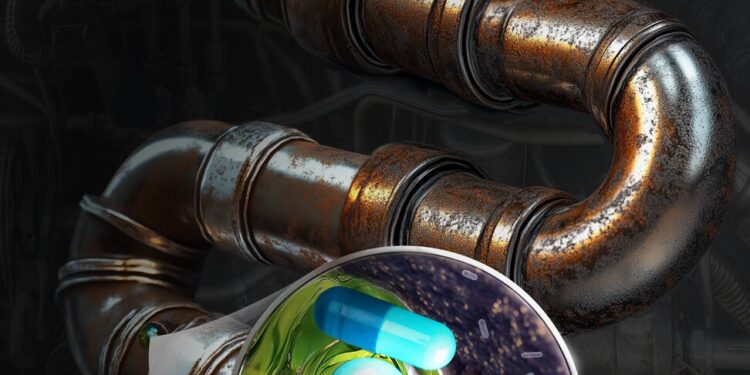Artist’s interpretation of the study. The tube represents the intestine, with antibiotics blocking the flow of mucus. Credit: DrawImpacts/Bar-Ilan University
In a study published in Scientific progressDr. Shai Bel and his research team at Bar-Ilan University’s Azrieli Faculty of Medicine have discovered crucial information about how antibiotic use increases the risk of inflammatory bowel disease (IBD).
The study shows that antibiotics interfere with the protective mucus layer in the gut, a finding that could reshape our understanding of the effects of antibiotics and the development of IBD.
Inflammatory bowel diseases (IBD), which include Crohn’s disease and ulcerative colitis, affect approximately 1% of the world’s population. This debilitating disease is characterized by the erosion of the mucosal layer that serves as a critical barrier between the gut microbiome and the immune system.
Despite ongoing research, the exact causes of IBD remain unclear. However, previous studies have shown a link between antibiotic use and an increased risk of developing IBD.
Dr. Bel’s latest research sheds new light on this association. “We found that antibiotic use actually damages the protective mucus layer that separates the gut’s immune system from the microbiome,” Dr. Bel says. His team’s study reveals that antibiotics, whether given orally or by injection, disrupt this vital mucus layer, making it easier for bacteria to enter and increasing the risk of intestinal inflammation.
Using advanced techniques such as RNA sequencing, machine learning, and measurement of mucus secretion, the researchers examined the effects of antibiotics using mouse models. The study found that antibiotics impair the secretion of protective mucus, leading to bacterial infiltration, systemic replication of bacterial antigens, and the development of ulcers, which are hallmarks of IBD.
One of the most striking findings of the study is that the impact of antibiotics on the mucosal barrier is not due to alterations in the microbiome, but rather affects the cells in the intestinal wall responsible for mucus production. “This discovery breaks the paradigm that antibiotics only harm bacteria and not our own cells,” says Dr. Bel.
The research team plans to investigate potential treatments that could mitigate the adverse effects of antibiotics on mucus secretion as a next step. These findings not only provide a better understanding of IBD, but also highlight the need to carefully consider antibiotic use and its broader implications for gut health.
More information:
Jasmin Sawaed et al, Antibiotics damage the colonic mucosal barrier in a microbiota-independent manner, Scientific progress (2024). DOI: 10.1126/sciadv.adp4119. www.science.org/doi/10.1126/sciadv.adp4119
Provided by Bar-Ilan University
Quote:Study reveals how antibiotics contribute to risk of inflammatory bowel disease (2024, September 11) retrieved September 11, 2024 from
This document is subject to copyright. Apart from any fair dealing for the purpose of private study or research, no part may be reproduced without written permission. The content is provided for informational purposes only.



